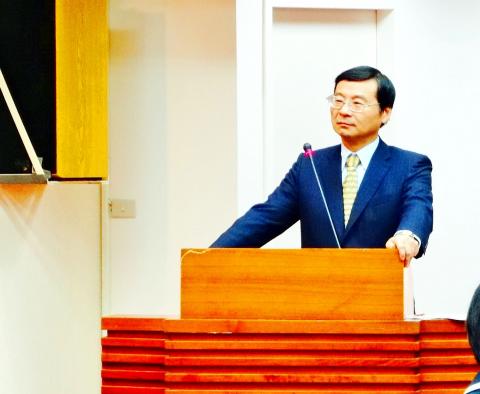The Bankers Association of the Republic of China (銀行公會) yesterday suggested that the Financial Supervisory Commission (FSC) free it from the duty of drawing up clauses for the draft act governing third-party payment services to avoid criticism over a conflict of interests.
Association chairwoman Lee Jih-chu (李紀珠), who was vice chairwoman of the commission from 2008 to 2010, made the suggestion in a long statement after domestic e-commerce providers questioned the association’s neutrality and the propriety of the group dealing with the issue.
SUGGESTION

Photo: Wang Meng-lun, Taipei Times
“I sincerely suggest that the commission make Internet firms draw up the drafts to facilitate the legislative process,” Lee said in the statement.
Lee’s statement also came after PChome Online Inc (網路家庭) chairman Jan Hung-tze (詹宏志) criticized the government over slow development of the nation’s third-party payment services and its reluctance to receive feedback from Internet companies regarding the draft act.
‘BLACK-BOX’ TALKS
The banking industry, the hardest hit by the rise of third-party payment services over the Internet, should not be put in charge of the matter, Jan has said on other occasions.
“The association acted behind closed doors, excluding online enterprises. It acted unilaterally in a secretive manner,” Jan has said.
Lee dismissed Jan’s accusation, saying that there definitely were no “black box” negotiations.
“I believe that both sides, the commission and the Bankers Association, have good intentions,” Lee said earlier this week.
“They hope to implement the laws as soon as possible, so enterprises that need them can begin to use them,” she said.
In the statement, Lee said the association has carried out its duty as instructed by the financial regulator, but it would be appropriate to limit itself to an advisory role and provide help only when needed.
Jan welcomed the gesture, saying that the commission should take heed and allow Internet companies to dominate the drawing up of legislative drafts related to third-party payments.
The commission has overlooked potential legal conflicts and could make amends by passing the duty to Internet firms, Jan said in a statement yesterday.
APOLOGY
Jan also offered an apology to Lee.
The controversy led FSC Chairman William Tseng (曾銘宗) to say at the Finance Committee that the commission would be in full charge of drawing up the draft act’s clauses and would invite third-party payment operators to join further discussion.

NEW IDENTITY: Known for its software, India has expanded into hardware, with its semiconductor industry growing from US$38bn in 2023 to US$45bn to US$50bn India on Saturday inaugurated its first semiconductor assembly and test facility, a milestone in the government’s push to reduce dependence on foreign chipmakers and stake a claim in a sector dominated by China. Indian Prime Minister Narendra Modi opened US firm Micron Technology Inc’s semiconductor assembly, test and packaging unit in his home state of Gujarat, hailing the “dawn of a new era” for India’s technology ambitions. “When young Indians look back in the future, they will see this decade as the turning point in our tech future,” Modi told the event, which was broadcast on his YouTube channel. The plant would convert

‘SEISMIC SHIFT’: The researcher forecast there would be about 1.1 billion mobile shipments this year, down from 1.26 billion the prior year and erasing years of gains The global smartphone market is expected to contract 12.9 percent this year due to the unprecedented memorychip shortage, marking “a crisis like no other,” researcher International Data Corp (IDC) said. The new forecast, a dramatic revision down from earlier estimates, gives the latest accounting of the ongoing memory crunch that is affecting every corner of the electronics industry. The demand for advanced memory to power artificial intelligence (AI) tasks has drained global supply until well into next year and jeopardizes the business model of many smartphone makers. IDC forecast about 1.1 billion mobile shipments this year, down from 1.26 billion the prior

People stand in a Pokemon store in Tokyo on Thursday. One of the world highest-grossing franchises is celebrated its 30th anniversary yesterday.

Zimbabwe’s ban on raw lithium exports is forcing Chinese miners to rethink their strategy, speeding up plans to process the metal locally instead of shipping it to China’s vast rechargeable battery industry. The country is Africa’s largest lithium producer and has one of the world’s largest reserves, according to the US Geological Survey (USGS). Zimbabwe already banned the export of lithium ore in 2022 and last year announced it would halt exports of lithium concentrates from January next year. However, on Wednesday it imposed the ban with immediate effect, leaving unclear what the lithium mining sector would do in the